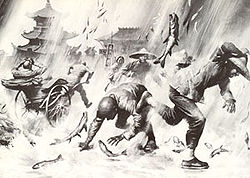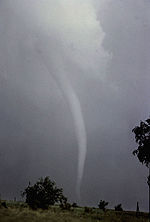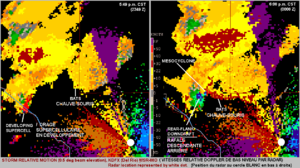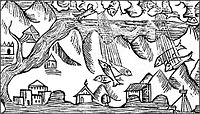- Raining animals
-
Raining animals is a rare meteorological phenomenon in which flightless animals "rain" from the sky. Such occurrences have been reported from many countries throughout history. One hypothesis offered to explain this phenomenon is that strong winds traveling over water sometimes pick up creatures such as fish or frogs, and carry them for up to several miles.[1] However, this primary aspect of the phenomenon has never been witnessed or scientifically tested.
Sometimes the animals survive the fall, suggesting the animals are dropped shortly after extraction. Several witnesses of raining frogs describe the animals as startled, though healthy, and exhibiting relatively normal behavior shortly after the event. In some incidents, however, the animals are frozen to death or even completely encased in ice. There are examples where the product of the rain is not intact animals, but shredded body parts. Some cases occur just after storms having strong winds, especially during tornadoes.
However, there have been many unconfirmed cases in which rainfalls of animals have occurred in fair weather and in the absence of strong winds or waterspouts.
Rains of animals (as well as rains of blood or blood-like material, and similar anomalies) play a central role in the epistemological writing of Charles Fort, especially in his first book, The Book of the Damned. Fort collected stories of these events and used them both as evidence and as a metaphor in challenging the claims of scientific explanation.
The English language idiom "it is raining cats and dogs", referring to a heavy downpour, is of uncertain etymology, and there is no evidence that it has any connection to the "raining animals" phenomenon.
Note that this is a regular occurrence for birds, which can get killed in flight, or stunned, and then fall (unlike flightless creatures, which first have to be lifted into the air by an outside force). Sometimes this happens in large groups, for instance, the blackbirds falling from the sky in Beebe, Arkansas, United States on December 31, 2010.[2] It is common for birds to become disoriented (for example, because of bad weather or fireworks) and collide with objects such as trees or buildings, killing them or stunning them into falling to death. The number of blackbirds killed in Beebe is not spectacular considering the size of their congregations, which can be in the millions.[3] The event in Beebe, however, captured the imagination and lead to more reports in the media of birds falling from the sky across the globe, such as in Sweden and Italy,[4] though many scientists claim such mass deaths are common occurrences but usually go unnoticed.[5]
Contents
Explanations
French physicist André-Marie Ampère was among the first scientists to take seriously accounts of raining animals. He tried to explain rains of frogs with a hypothesis that was eventually refined by other scientists. Speaking in front of the Society of Natural Sciences, Ampère suggested that at times frogs and toads roam the countryside in large numbers, and that the action of violent winds can pick them up and carry them great distances.[6]
More recently, a scientific explanation for the phenomenon has been developed that involves tornadic waterspouts.[7] Waterspouts are capable of capturing objects and animals and lifting them into the air. Under this theory, waterspouts or tornados transport animals to relatively high altitudes, carrying them over large distances. The winds are capable of carrying the animals over a relatively wide area and allow them to fall in a concentrated fashion in a localized area.[8] More specifically, some tornadoes can completely suck up a pond, letting the water and animals fall some distance away in the form of a rain of animals.[9]
This hypothesis appears supported by the type of animals in these rains: small and light, usually aquatic.[10] It is also supported by the fact that the rain of animals is often preceded by a storm. However the theory does not account for how all the animals involved in each individual incident would be from only one species, and not a group of similarly-sized animals from a single area.
In the case of birds, storms may overcome a flock in flight, especially in times of migration. The image to the right shows an example where a group of bats is overtaken by a thunderstorm.[11] The image shows how the phenomenon could take place in some cases. In the image, the bats are in the red zone, which corresponds to winds moving away from the radar station, and enter into a mesocyclone associated with a tornado (in green). These events may occur easily with birds in flight. In contrast, it is harder to find a plausible explanation for rains of terrestrial animals; the enigma persists despite scientific studies.
Sometimes, scientists have been incredulous of extraordinary claims of rains of fish. For example, in the case of a rain of fish in Singapore in 1861, French naturalist Francis de Laporte de Castelnau explained that the supposed rain took place during a migration of walking catfish, which are capable of dragging themselves over the land from one puddle to another.[12] Thus, he argued that the appearance of fish on the ground immediately after a rain was easily explained, as these animals usually move over soft ground or after a rain.
Occurrences
The following list is a selection of examples.
Fish
- Singapore, February 22, 1861[13]
- Olneyville, Rhode Island, May 15, 1900[14]
- Marksville, Louisiana, October 23, 1947[15]
- Bhanwad, Jamnagar, India, Oct 24, 2009[16]
- Lajamanu, Northern Territory, Australia, February 25 and 26, 2010,[17]
Frogs and toads
- Ishikawa Prefecture, Japan, June 2009 (Occurrences reported throughout the month)[18]
- Rákóczifalva, Hungary, 18–20 June 2010 (two times)[19]
Others
- An unidentified animal (thought to be a cow) fell in California ripped to tiny pieces on August 1, 1869; a similar incident was reported in Olympian Springs, Bath County, Kentucky in 1876[20]
- Jellyfish fell from the sky in Bath, England, in 1894[21]
- Worms dropped from the sky in Jennings, Louisiana, on July 11, 2007.[22]
- Spiders fell from the sky in Salta Province, Argentina on April 6, 2007.[23]
- Scottish school children are hit by worms during PE class on a cloudless day, April 1, 2011.[24]
- Orange eggs of an unknown species of invertebrate rained down on the Alaskan city of Kivalina on August 4, 2011.[25]
In literature and popular culture
- Raining animals are relatively common in Terry Pratchett's Discworld. The explanation given is magical weather. One small village in the mountainous, landlocked Ramtops operates a successful fish cannery due to regular rains of fish.[26] The Omnian religion includes several accounts of religious figures being saved by miraculous rains of animals, one being an elephant.[27] Other items include bedsteads, coal scuttles, cake and tinned sardines.[28]
- Fish fall from the sky in Kafka on the Shore by Haruki Murakami.
- In the Red Dwarf episode Confidence and Paranoia, fish rain in Lister's sleeping quarters.
- Raining frogs are shown in the 1999 New Line Cinema movie, Magnolia. Frogs rain down and cause havoc on drivers.
- In the role-playing game The Elder Scrolls IV: Oblivion, the player can do an optional quest given by Sheogorath, the Daedric Prince of Madness, which involves playing a prank on a small, peaceful-yet-superstitious village. The player is told to perform certain actions that will fulfill a prophecy within the village that is believed to herald the end of the world, thus causing all of the villagers to panic. The final event foretold in the prophecy is flaming dogs raining from the sky, which, unlike the other events of the prophecy, is achieved by the Daedra Lord himself and his powers.
- A sperm whale and a bowl of petunias were called into existence above the alien planet Magrathea in The Hitchhiker's Guide to the Galaxy by Douglas Adams. The whale had only moments to come to terms with its new identity and purpose during the ultimately fatal plummet to Magrathea's surface. The bowl of petunias had been in similarly terminal situations before.
- The character Cris Johnson in the film Next relates as fact that fish eggs were re-hydrated after being evaporated from the ocean near Denmark, resulting in a rain of fish.
- John Hodgman's satirical almanac More Information Than You Require makes references to multiple events involving raining animals.
- The short story 'Rainy Season' by Stephen King from the collection Nightmares and Dreamscapes is about frogs with sharp teeth falling from the sky.
- In the 2010 film, Wonderful World, Ben Singer (played by Matthew Broderick), experiences raining fish at the end of the film, while in Senegal. His close friend Ibu had told him about the phenomenon earlier in the film.
- In "Summer Knight" from The Dresden Files by Jim Butcher, the book's first line says: "It rained toads...".
- In the sixth part of JoJo's Bizarre Adventure, a character with the power to control weather causes a rain of frogs.
"Raining cats and dogs"
The English idiom "it is raining cats and dogs", used to describe an especially heavy rain, is of unknown etymology, and is not necessarily related to the "raining animals" phenomenon.[29] The phrase (with "polecats" instead of "cats") was used at least since the 17th century.[30][31] A number of improbable folk etymologies have been put forward to explain the phrase,[32] for example:
- An "explanation" widely circulated by email claimed that in 16th-century Europe when peasant homes were commonly thatched, animals could crawl into the thatch and find shelter from the elements, and would fall out during heavy rain. However, there seems to be no evidence in support of either assertion.[33]
- Drainage systems on buildings in 17th century Europe were poor, and may have disgorged their contents during heavy showers, including the corpses of any animals that had accumulated in them. This occurrence is documented in Jonathan Swift's 1710 poem 'Description of a City Shower', in which he describes "Drowned puppies, stinking sprats, all drenched in mud,/Dead cats and turnip-tops come tumbling down the flood."
- "Cats and dogs" may be a corruption of the Greek word Katadoupoi, referring to the waterfalls on the Nile,[29] possibly through the old French word catadupe ("waterfall").
- The Greek phrase "kata doksa", which means "contrary to expectation" is often applied to heavy rain, but there is no evidence to support the theory that it was borrowed by English speakers.[29]
There may not be a logical explanation; the phrase may have been used just for its nonsensical humor value, like other equivalent English expressions ("it is raining pitchforks", "hammer handles", etc.).
Other languages have equally bizarre expressions for heavy rain:[34][35]
- Afrikaans: ou vrouens met knopkieries reen ("old women with clubs")
- Bengali: মুষলধারে বৃষ্টি পড়ছে musholdhare brishṭi poṛchhe ("in a stream of mallets")
- Bosnian: padaju ćuskije ("crowbars")
- Cantonese: "落狗屎" ("dog poo")
- Chinese: "倾盆大雨" ("rains that can knock over a basin")
- Catalan: Ploure a bots i barrals ("boats and barrels")
- Czech: padají trakaře ("wheelbarrows")
- Danish: det regner skomagerdrenge ("shoemakers' apprentices")
- Dutch: het regent pijpenstelen ("pipe stems or stair rods")
- Dutch (Flemish): het regent oude wijven ("old women")
- Dutch (Flemish): het regent kattenjongen ("kittens")
- Faroese : Tað regnar av grind ("Pilot whales")
- French: il pleut des hallebardes ("it is raining halberds"), clous ("nails"), or cordes ("ropes")
- German: Es regnet junge Hunde ("young dogs")
- Greek: βρέχει καρεκλοπόδαρα ("chair legs")
- Hindi: musaldhār bārish ("a stream of mallets")
- Icelandic: Það rignir eins og hellt sé úr fötu ("like poured from a bucket")
- Irish: tá sé ag caitheamh sceana gréasaí ("cobblers knives")
- Norwegian: det regner trollkjerringer ("she-trolls")
- Polish: pada żabami ("frogs")
- Portuguese: está a chover canivetes ("penknives")
- Portuguese: Chove a potes ("It rains the pots")
- Portuguese: Chove a cântaros ("It rains the pots")
- Portuguese (the very most popular): Está a chover como o caralho ("It's raining like hell")
- Romanian: plouă cu broaşte ("frogs")
- Russian: льет как из ведра ("from a bucket")
- Spanish: está lloviendo chuzos de punta ("shortpikes/icicles point first" - not only is it raining a lot, but it's so cold and windy that being hit by the drops hurts)
- Spanish (Mexico): está lloviendo a cántaros ("by the clay pot-full")
- Spanish (Argentina): caen soretes de punta ("pieces of dung head-first")
- Spanish: llueve sapos y culebras ("toads and snakes")
- Serbian: padaju sekire ("axes")
- Swedish: regnet står som spön i backen ("the rain stands like poles in the hill")
- Welsh: mae hi'n bwrw hen wragedd a ffyn ("old ladies and sticks")
See also
- Lluvia de Peces, (Honduras, "Rain of Fishes")
- Exploding animals
- Magnolia
- The Fortean Times
- "It's Raining Men"
- Red rain in Kerala
- Star jelly
- Cattle mutilation
- Blood rain
References
- ^ How can it rain fish?
- ^ "More than 1,000 blackbirds fall out of Arkansas sky". BBC News. 2 January 2011. http://www.bbc.co.uk/news/world-us-canada-12105157. Retrieved 2 January 2011.
- ^ "Why Are Birds Falling From the Sky?". National Geographic. 6 January 2011. http://news.nationalgeographic.com/news/2011/01/110106-birds-falling-from-sky-bird-deaths-arkansas-science/. Retrieved 6 January 2011.
- ^ "Now It's Dead Doves Falling From Sky in Italy". "AOL". 7 January 2011. http://www.aolnews.com/2011/01/07/now-its-dead-doves-falling-from-sky-in-italy/. Retrieved 7 January 2011.
- ^ "FACT CHECK: Mass bird, fish deaths occur regularly". "Associated Press". 7 January 2011. http://www.google.com/hostednews/ap/article/ALeqM5jUMR9hgvvvjAem8_8-v5V9Ow-nug?docId=eb2eb78242fe4290a414e0644cda18a6. Retrieved 7 January 2011.
- ^ «Les pluies de crapauds» (French).
- ^ “Can it rain frogs, fish or other objects” (Aug 2010). Library of Congress. Aug. 26, 2010
- ^ Supernatural World uses this theory to explain a rain of fishes in Norfolk on August 8, 2000.
- ^ Orsy Campos Rivas includes this explanation in the article Lo que la lluvia regala a Yoro, which discusses a rain of fishes that occurs annually in Honduras. Hablemos online(Spanish)
- ^ Angwin, Richard Wiltshire weather - BBC, July 15, 2003
- ^ Bat-eating Supercell, National Weather Service, (March 19, 2006).
- ^ Comptes Rendus hebdomadaires des séances de l’Académie des sciences 52:880-81, 1861 (French).
- ^ McAtee, Waldo L. (May 1917). "Showers of Organic Matter". Monthly Weather Review 45 (5): 223. http://docs.lib.noaa.gov/rescue/mwr/045/mwr-045-05-0217.pdf. Retrieved 2009-01-26.
- ^ "Rained Fish", AP report in the Lowell (Mass.) Sun, May 16, 1900, p4
- ^ Greg Forbes. Spooky Weather. The Weather Channel. Posted: October 27, 2005
- ^ "Fish Rain", reported in the India : [1], Oct 24, 2009
- ^ "It's raining fish in Northern Territory", reported in news.com.au : [2], February 28, 2010
- ^ Demetriou, Danielle (2009-06-10). "Sky 'rains tadpoles' over Japan". Telegraph.co.uk. http://www.telegraph.co.uk/news/newstopics/howaboutthat/5491846/Sky-rains-tadpoles-over-Japan.html. Retrieved 2009-08-07.
- ^ "Szemtanúk szerint békaeső hullott a településre". szoljon.hu. 2010-06-21. http://szoljon.hu/jasz-nagykun-szolnok/bulvar/szemtanuk-szerint-bekaeso-hullott-a-telepulesre-312385. Retrieved 2010-06-21.
- ^ Fort, Charles (1919). "Ch. 4". The Book of the Damned. sacred-texts.com. pp. 44–6. http://www.sacred-texts.com/fort/damn/damn04.htm.
- ^ Fort, Charles (1919). "Ch. 4". The Book of the Damned. sacred-texts.com. p. 48. http://www.sacred-texts.com/fort/damn/damn04.htm.
- ^ "Worms Fall from the Sky in Jennings". WAFB Channel 9. 7 July 2007. http://www.wafb.com/Global/story.asp?S=6771977. Retrieved 12 December 2008.
- ^ "It's Raining Spiders!". Epoch Times. 6 April 2007. http://en.epochtimes.com/news/7-10-12/60694.html. Retrieved 27 April 2010.
- ^ "Never Mind Cats and Dogs". The Scotsman. 1 April 2011. http://news.scotsman.com/odd/Never-mind-cats-and-dogs.6744480.jp. Retrieved 22 April 2011.
- ^ "Mysterious Orange Goo in Alaska Tiny Eggs of Unknown Species". International Business Times. August 9, 2011. http://www.ibtimes.com/articles/194728/20110809/mysterious-orange-goo-in-alaskan-noaa-village-identified-as-tiny-eggs-but-species-unknown-alien-life.htm. Retrieved 9 August 2011.
- ^ Pratchett, Terry (1997). The Discworld Companion. Books Britain. p. 319. ISBN 0575600306.
- ^ Pratchett, Terry (1998). Jingo. London: Corgi. pp. 252–3. ISBN 055214598X.
- ^ Pratchett, Terry (1998). Jingo. London: Corgi. p. 241. ISBN 055214598X.
- ^ a b c Raining Cats and Dogs, Anatoly Liberman
- ^ Richard Brome (1652), The City Witt: "It shall rain dogs and polecats."
- ^ Robert Laurence, Raining Cats And Dogs. Accessed on 2009-07-28.
- ^ "Life in the 1500s". Snopes.com. 2007. http://www.snopes.com/language/phrases/1500.asp.
- ^ Raining cats and dogs at The Phrase Finder site. Accessed on 2009-07-28.
- ^ WordReference.com Language Forums, accessed on 2009-07-28.
- ^ It's raining cats and dogs at Omniglot.com. Accessed through Google's cache on 2009-07-28.
External references
- Raining cats and dogs
- Raining animals in the British Isles[dead link]
- A review on the American perspective
- 10 Craziest Things To Fall From the Sky
Categories:- Anomalous weather
- Animals in popular culture
Wikimedia Foundation. 2010.





